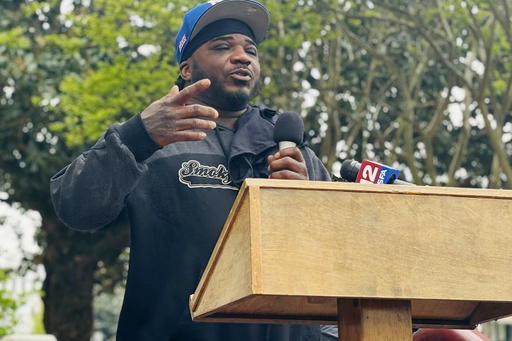
MONTGOMERY, Ala. — The Alabama Supreme Court has paved the way for the execution of Robin “Rocky” Myers, a man who has maintained his innocence in a case that dates back to 1991. Myers was found guilty of murdering his neighbor, Ludie Mae Tucker, and will face execution by nitrogen gas at a date determined by the governor’s office.
A juror from Myers’ original trial in 1994 has come forward supporting his claim of innocence and is pleading with Governor Kay Ivey to grant clemency, arguing that Myers should serve a life sentence instead of facing execution. Mae Puckett, who was part of the jury, expressed her doubts about the case, stating, “I know he is innocent. They never proved he did it. They never proved he was in the house,” in a recent interview.
Myers’ legal representation, Kacey Keeton, described numerous failures in the case, emphasizing the absence of physical evidence connecting Myers to the murder. She noted that an earlier attorney abandoned his responsibilities, which led to Myers missing critical deadlines in 2003 for federal appeals. Moreover, a key witness for the prosecution has recanted their testimony, and a judge overturned the jury’s recommendation for a life sentence, which was a result of Alabama’s previous practice allowing judges to impose death sentences.
Keeton stated, “For those who support the death penalty, Rocky Myers’s case should give you pause. I believe, without reservation, that Rocky Myers did not commit a murder, but you don’t have to agree with me on that to believe that the death penalty is not appropriate in this case.”
In October 1991, 69-year-old Tucker was tragically stabbed in her home in Decatur. A cousin who survived the assault testified that a man rang the doorbell in the middle of the night and asked to use the phone, followed by hearing Tucker scream for help. Before her passing, she described her attacker as a short, stocky Black man, though she did not provide a specific identity.
At the time, Myers lived in the neighborhood with his family. His son, LeAndrew Hood, recalls that they would often visit Tucker to buy ice. He highlighted the inconsistency of Tucker identifying her assailant, saying, “She knew us. She had enough breath to say it was a short, stocky Black man. If it was my father, all she had to do was say it was the man across the street.”
Puckett disclosed that there were hesitations among some jurors regarding Myers’ guilt, but there was a fear that a mistrial would lead to a harsher sentence from a new jury. To avoid this, they compromised by voting 9-3 to recommend life in prison, yet the judge subsequently sentenced Myers to death, taking advantage of a system that allowed judicial override of the jury’s opinion. Puckett expressed regret, saying, “The deck was stacked against him before it ever started. It was just an awful, awful thing, and it still is.”
Additionally, a lawyer from Tennessee, Earle Schwarz, represented Myers for a short period through a pro bono national network. However, Schwarz failed to inform Myers that he was no longer working on his case, leading to Myers missing a critical deadline in 2023 for federal habeas corpus petition filing. Though the 11th Circuit Court deemed this abandonment “inexcusable,” they also remarked that Myers should have taken steps to understand his case’s status.
Under current U.S. law, intellectually disabled individuals cannot face execution. Myers’ IQ tests showed scores of 64 and 71 in his youth, and a score of 73 in 2013. The state maintains, however, that a psychologist assessed his IQ at 84 in 2006, indicating he could be eligible for execution, although his attorneys argue that this figure is an outlier.
The Alabama attorney general’s office responded to Puckett’s claims by asserting that her doubts do not equate to proof of innocence. They noted in court filings, “The affidavit, read in the light most favorable to Myers, states only that some of the jurors had doubts as to Myers’s guilt — it does not prove that he was actually innocent or that the trial court erred by overriding the jury’s recommendation.”
With Myers’ fate hanging in the balance, Keeton highlighted clemency as his remaining hope, emphasizing its role as a safeguard for instances where the judicial system has failed, as she believes it has in this case. “Clemency is designed as a failsafe. If the system fails—as it has repeatedly failed Mr. Myers—clemency is there to save his life,” she asserted.

